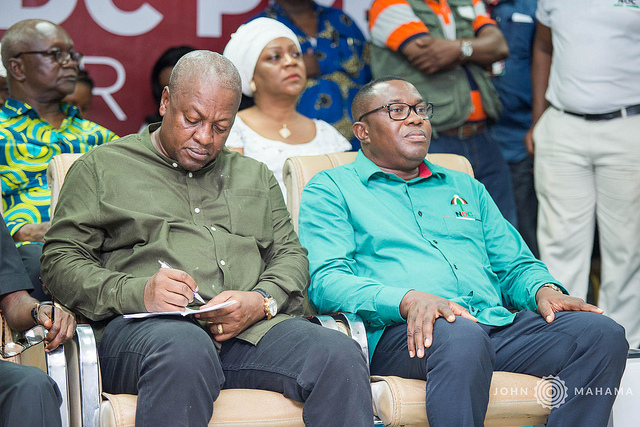Militia disbandment: Wider participation will help – Ofosu Ampofo to Nana Addo
The opposition National Democratic Congress (NDC) has once again written to President Akufo-Addo as they want wider participation in the meeting to disband the political party militia.
In a letter signed by the party’s National Chairman, Samuel Ofosu-Ampofo to President Akufo-Addo, on Monday explained that their decision is to find a lasting solution to canker by involving all other stakeholders.
“Our position on participation is quite simple: a lasting solution to the crisis of political violence requires that we involve all stakeholders. This is generally accepted as good practice…the stakeholders in the struggle against political violence cannot reasonably be limited to the two largest political parties,” the statement reads.
The NDC had earlier written to the President asking for the inclusion of all the other political parties and wanted the Peace Council to serve as a mediator in the dialogue.
Delivering his 2019 State of the Nation Address in Parliament, President Akufo-Addo said he had instructed the leadership of the NPP, which he belongs to, to extend an invitation to the opposition NDC to discuss how to disband their respective vigilante groups.
Below are excerpts of the NDC’s letter
Scope of Participation
Your Excellency, our letter did not call for CSOs and other proposed participants to disband their militias. We obviously did not suggest that the National Peace Council has an armed militia. We rather called for wider participation in a citizens’ process to end organised political violence. Our position on participation is actually quite simple: a lasting solution to the crisis of political violence requires that we involve all stakeholders. This is generally accepted as good practice.
We define stakeholders to include all those who are affected by a policy; all those who will be involved in policy implementation; and all those who by dint of their work or expertise in the relevant area of policy have informed perspectives to contribute to policymaking. The stakeholders in the struggle against political violence cannot reasonably be limited to the two largest political parties.
The list of stakeholders we proposed can of course be tightened or expanded. We however think it would be a tragedy to go forward on the narrow basis of only the two major political parties considering the gravity of the matters to be considered and the danger that the threat of unregulated use of force by unauthorized armed groups poses to civil society and, indeed, to those who bear arms lawfully as mandated by the 1992 4th Republican Constitution of which you are the principal guardian.
Facilitation
Your Excellency, our position on facilitation flows logically from our position on participation. We are not looking at a principally juridical process. As indicated, we envisage a large and complex citizens’ process. There will be several different stakeholders with different perspectives and priorities. The process itself will involve elements of goal-setting, fact-finding, confidence-building, reconciliation, policy prescription and mobilisation of public opinion.
These may require a combination of different approaches, techniques, and skills. With such complex processes there is a need to involve institutions or experts who specialise in process facilitation. This involves expertise in both the logical and psychological sub-processes required. Professional facilitators can ensure that all participants listen and are heard; that different perspectives and proposals are properly evaluated; that conflicts are analysed and understood; that individuals and institutional participants do not feel attacked; and that effective consensus is built towards clear actionable outcomes – all within a reasonable time frame.
The sad fact is that this expertise does not reside in any meaningful way in the current political establishment as much as it does in civil society and in the international community. Indeed, a significant element of the crisis we currently face is the winner-takes-all culture of our national politics.
Your Excellency, NDC and NPP have indeed been the most successfully parties of the 4th Republic and have a an absolutely critical role to play in achieving the change of direction needed. This can be reflected in the process we develop for this initiative. However, Your Excellency, our parties do not begin to represent the full scope of Ghanaian opinion as your letter suggests.
The same forces that protect” prominent politicians are engaged in communal violence around chieftaincy disputes.
It is precisely this stark reality that provides compelling and persuasive argument that our two great parties cannot do it alone and that we need important assistance from the wider society to achieve lasting verifiable solutions that will assure peace and security to our citizens, our parties and our nation.
Your Excellency, we note also that the problems we face in Ghana exist to a greater or lesser degree in many other countries.
Your Excellency, it would be easy to test your belief that Ghanaians are happy to leave the question of political violence to be resolved bilaterally by NDC and NPP. We respectfully request that you invite the public and entities such as the Ghana Peace Council or the various expert institutions to weigh in on this debate. We have already begun to sound out other stakeholders and believe that there is considerable interest in participating in a process such as we have described.
Click here to read the NDC’s new letter to President Akufo-Addo


Comments are closed.